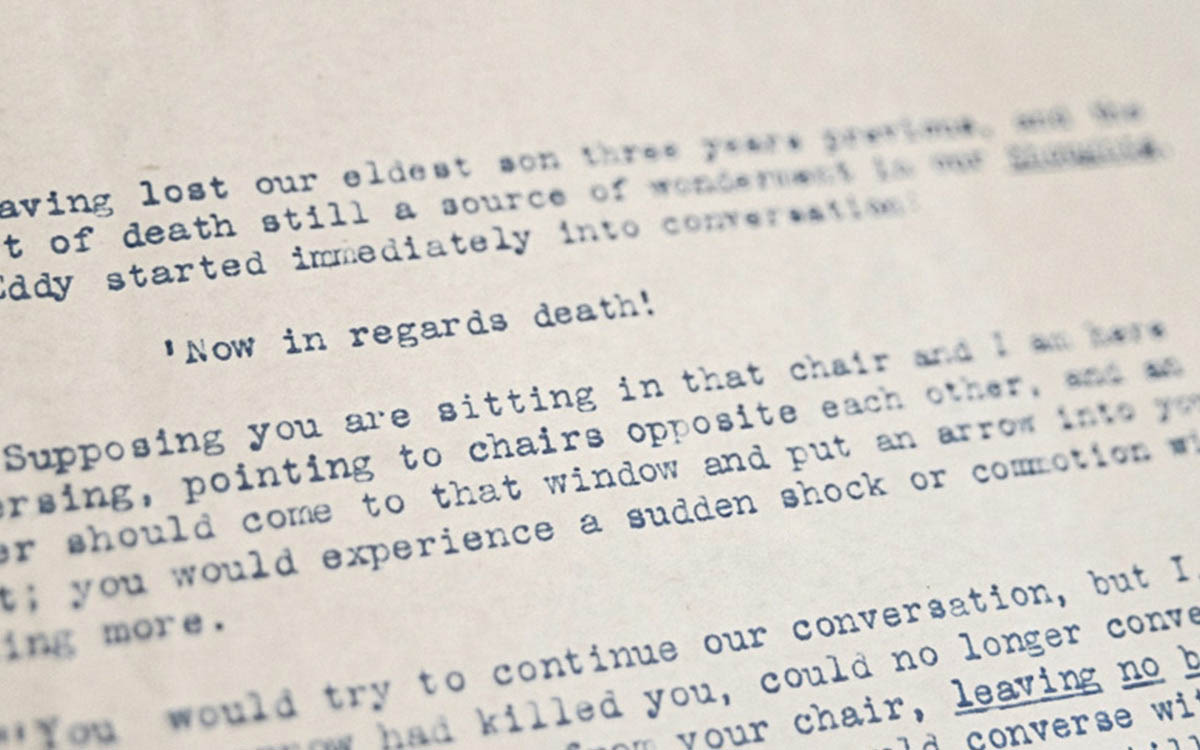Remarks by Mary Baker Eddy on death

Excerpt from the September 23, 1918, reminiscence of Florence E. Riley.
We are often asked about a time when Mary Baker Eddy consoled a couple that had lost a child.
An account of this experience appears in a letter from our Reminiscence collection. Florence E. Riley wrote about a visit she and her husband, Dr. Frank Riley, made to Eddy in November 1897. Their eldest son had recently died. Florence Riley recalled what Eddy said:
“Now in regards death!
“Supposing you are sitting in that chair and I am here conversing, pointing to chairs opposite each other, and an archer should come to that window and put an arrow into your heart; you would experience a sudden shock or commotion within, nothing more.
“You would try to continue our conversation, but I, believing the arrow had killed you, could no longer converse with you. So you would arise from your chair, leaving no body in the chair, and go amongst those you could converse with, while I would have to bury my belief of you which was still in the chair.”1
In her reminiscence, Adelaide Still, who served in Eddy’s household from 1907 to 1910, recalled Eddy making similar remarks unrelated to her discussion with the Rileys:
[Laura Sargent] also told me that one evening, as they were sitting at the supper table, Mrs. Eddy was eating a piece of pie, when she said, “If I should pass on while sitting in this chair, I should wake up right in the chair, and the piece of pie would be there.” Mrs. Sargent asked, “Should we be with you, Mother?” She answered, “I haven’t proved that yet.”
This agrees with another incident. One day Mrs. Eddy called the students and said, “If I were lying on this couch and someone should come in with an axe and chop my head off, I should wake up right on the couch, but my head wouldn’t be off.”2
Eddy discussed the subject of death extensively in her major work, Science and Health with Key to the Scriptures. The book references the word death well over 300 times. “Mortals waken from the dream of death,” she wrote, “with bodies unseen by those who think that they bury the body.”3 In another place she made this observation: “Jesus’ unchanged physical condition after what seemed to be death was followed by his exaltation above all material conditions; and this exaltation explained his ascension, and revealed unmistakably a probationary and progressive state beyond the grave.”4
- Florence E. Riley, 23 September 1918, Reminiscence, Florence E. Riley, 2.
- M. Adelaide Still, “Reminiscences of The Time I Spent in Mrs. Eddy’s Home May 1907 to December 1910,” n.d., Reminiscence, M. Adelaide Still, 65.
- Mary Baker Eddy, Science and Health with Key to the Scriptures (Boston: The Christian Science Board of Directors), 429.
- Eddy, Science and Health, 46.

